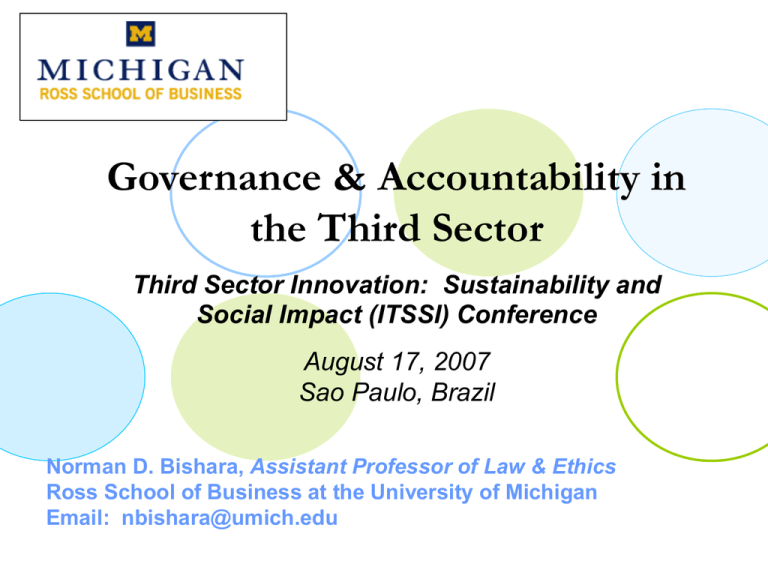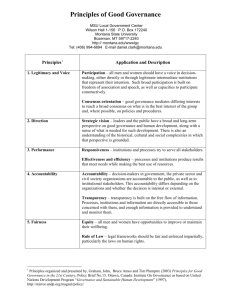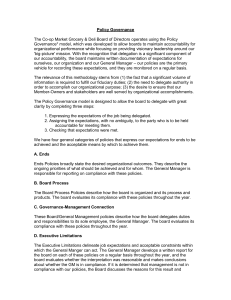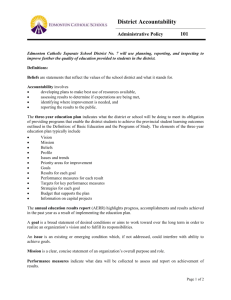Day 10: Monday October 11 Chapter 15. (pp. 268
advertisement

Governance & Accountability in the Third Sector Third Sector Innovation: Sustainability and Social Impact (ITSSI) Conference August 17, 2007 Sao Paulo, Brazil Norman D. Bishara, Assistant Professor of Law & Ethics Ross School of Business at the University of Michigan Email: nbishara@umich.edu Session Outline and Format: I. Introductions II. Presentations: Moderator: Norm Bishara, Stephen M. Ross School of Business at the University of Michigan (20-25 Minutes) Speakers: Josmar Verillo, Amarribo (20 Minutes) Ben Powell, Agora Partnership (20 Minutes) Jesus Garcia, ITS – Instituto de Tecnologia (20 Minutes) Brief Moderator Wrap-Up (5 Minutes) III. Discussion (30 Minutes) IV. Conclusion N. Bishara August 17, 2007 I. Introductions Speakers: Josmar Verillo, Amarribo Ben Powell, Agora Partnership Jesus Garcia, ITS – Instituto de Tecnologia Social Moderator: Norm Bishara N. Bishara August 17, 2007 II. Presentations A brief word about my background The goal for comments on governance and accountability Big picture: background and trends for NGOs Specific example: board of directors N. Bishara August 17, 2007 A Model of the Management Structure of a Nonprofit/NGO Officers & Staff Run the day-to-day operations of the organization Board of Directors - Manage the business of the organization - Determine the strategy, goals w/in the mission - Delegate authority to director and staff - Select and remove staff, and determine compensation Constituents N. Bishara August 17, 2007 (recipients of services; may also serve as advisors; broadly conceived) Big Picture of Governance/Accountability World Bank Governance Matters Report (2007) Transparency International’s Corruption Perceptions Index (2006); Corruption & Governance Measurement Tools in Latin American countries (2006) Trends in Corporate Governance Also, civil society organization-level challenges N. Bishara August 17, 2007 Trends in NGO Governance & Accountability Pressure on NGOs to act more like businesses (social enterprise and the “marketization” of the third sector) positive or negative? Changing funding sources and funding environment Government, regulator & constituent pressure Globalization and rising status of NGOs Other (including scandals and IT) N. Bishara August 17, 2007 Example: High Performing Board of Directors Why boards? Accountable to whom? Internalize and prioritize principals Operating documents and guidelines “360 degree” view of stakeholders Consider a Code of Ethics Goal of functional transparency System of reporting and oversight Focus on member selection Professionalize the process; professionalize the membership and networking N. Bishara August 17, 2007 Conclusion Influences and Trends fostering governance and accountability Benefits Drivers of change and sustainability Boards and staff systems Continual follow-up and review Advantage to well-run and accountable organizations Next… N. Bishara August 17, 2007 As we move into the organizational case studies: Key Themes/Questions for the Panel is there pressure to develop and maintain good governance and accountability practices (and where is that pressure coming from)? how has your organization evolved with regard to its accountability and governance structures? how do other entity’s management structure and internal governance influence your goals? how do concerns of governance and accountability issues influence decision-making at your organization? Guidance: which experiences with governance and accountability development have been the most frustrating? The most rewarding? N. Bishara August 17, 2007 Next… II. Presentations (continued) Speakers: Josmar Verillo, Amarribo (20 Minutes) Ben Powell, Agora Partnership (20 Minutes) Jesus Garcia, ITS – Instituto de Tecnologia Social (20 Minutes) Brief Moderator Wrap-Up (5 Minutes) III. Discussion (30 Minutes) IV. Conclusion N. Bishara August 17, 2007 N. Bishara August 17, 2007




